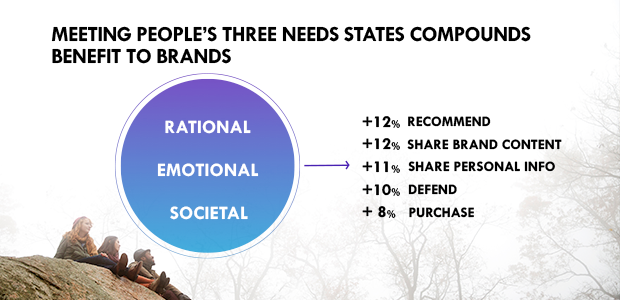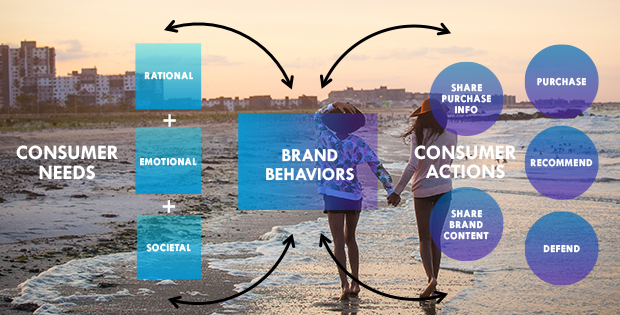brandshare™ 2014
In brandshare 2014, we extended Edelman’s largest-ever consumer marketing study, seeking to further understand the evolving relationship between people and brands. We wanted to know: what’s the business benefit of meeting people’s needs rationally, emotionally and societally? And how does this drive value for brands?
Ultimately, people seek mutual benefit from their relationships with brands. By fulfilling consumer needs, brands trigger consumer actions. These actions help build and preserve brands. There is both mutual contribution and mutual benefit. We call this the value exchange.
Through brandshare, we compared the relationship between consumer needs and brand behaviors. We determined whether consumers believe there is value exchange, assessed whether it has business value and articulated how to create a relationship that maximizes brand and consumer benefit. To do this:
- We surveyed consumer needs through nine need statements. These ranged from traditional needs, such as “consistent products and services,” to new and high-order needs, such as “the brand having a purpose that people can believe in.”
- We tested 14 brand behaviors, including “invites consumer participation in product development,” “openly shares its vision for the future,” “is quick to respond to people’s concerns and complaints” and “invites consumers to interact online.”
- We evaluated five actions that people may take that will benefit brands. Here, we started by looking at traditional metrics, such as purchase and recommend. We also included actions that are increasingly important in a hyper-connected and shareable landscape, such as defending brands, sharing brands’ content or sharing personal information.
Take a dive into brandshare to discover what fifteen thousand consumers told us about their relationships with brands today.
EIGHTY-SEVEN PERCENT OF PEOPLE WANT MEANINGFUL INTERACTIONS WITH BRANDS, BUT ONLY 17 PERCENT THINK BRANDS ARE ACTUALLY DELIVERING TODAY.
For a value exchange to exist, both consumers and brands must contribute to, and recognize a benefit from, their interactions.
Seventy percent of people around the world believe brands’ motivations to share is based upon self-centered desires to increase profits, rather than part of a sincere commitments to their customers.
People are clear in their demands for greater access to brands and a better understanding of brands’ convictions, while giving brands low grades in the behaviors they ranked as most important: access, involvement and conviction.
Through brandshare, we identified that wide gaps exist between the importance consumers place on a range of brand behaviors and brands’ performance against them. The gaps are widest in areas of brands’ responsiveness to people’s questions and ideas, brands creating opportunities for people to participate and brands having purpose and message.
Rational and emotional needs aren’t new. We all know that people’s emotional needs have always led to the brand-consumer relationship, and that rational needs are “the reason to believe.” brandshare proves that there are unexpected ways to meet those needs. Indeed, there’s a third need state, on top of rational and emotional, that brands simply cannot ignore – societal need.
Societal needs extend beyond traditional definitions of corporate responsibility (i.e. charitable donations) and sustainability (i.e. green manufacturing).
Our brandshare study validates the existence of societal needs as a third need state, and cements its importance as a core need that adds value to the consumer/brand relationship. Even more important: we found that when a brand meets all three types of consumer needs, the likelihood of consumers taking actions that benefit the brand is strongest.
The insight for marketers is simple: brands get a compound benefit when societal needs are fulfilled in addition to rational and emotional.

It’s not just about rebalancing the “one-sided” relationship brands have with people. Brands must meet consumers’ needs in order to achieve a true value exchange.
Brands must evolve from a transactional relationship to a dynamic one, where consumers and brands continually exchange value. For example, when a brand obtains data from a consumer, such as an email address, it becomes the responsibility of that brand to reciprocate and provide value in exchange for the data it received – that value must go beyond promoting the next purchase. Likewise consumers share a brand’s content because they find it valuable to themselves and peers. If continual value is provided, it leads to continual sharing, and both the brand and consumer benefit.
Conviction and commitment are the foundation of brands’ contribution to the value exchange. Eighty percent of our respondents say that brands must have a clear reason or purpose when sharing with people.
Brands need to evolve, to include both a brand promise as well as a brand purpose. They must articulate, and then embody, their reason for being that informs everything they do. Marketing and corporate communications functions must be aligned to ensure the brand story is heard and shared properly. Addressing societal needs must be inextricably linked to rational and emotional needs as part of the core marketing strategy.
The value exchange also requires storytelling and story sharing. Consumers want to be invited to be part of the development and refinement process of brands’ stories.

Brand promotion must begin by inviting people to actively participate in ways people find personally meaningful. Participation comes in many different forms. People will self-select the form of participation that best fits their needs – and they’ll challenge brands to take that feedback and act accordingly.
Brands must be “always on,” and always adapting. Responsive brands listen, learn and adapt to consumer feedback and are prepared to handle a variety of scenarios. It’s become quite trendy for brands to be a part of the conversation and that’s important, but it’s incomplete. Almost 90 percent of brandshare respondents say that they should be able to communicate and interact with brands quickly and in real time.
Truly responsive brands will not only adapt to feedback by adjusting marketing, but will make core refinements to how they behave in the world. When done right, these behaviors deliver real value not only to consumers, but the brands themselves. This continual refinement of behaviors informed by consumers’ ever-changing needs is the heart of today’s dynamic value exchange and is linked to measurable business outcomes.




